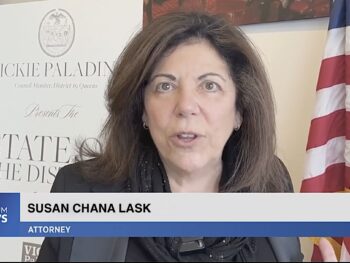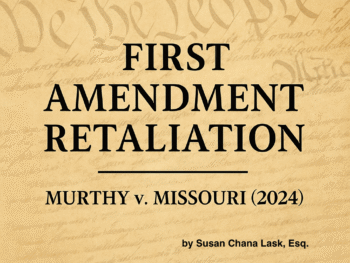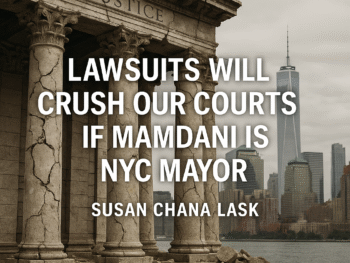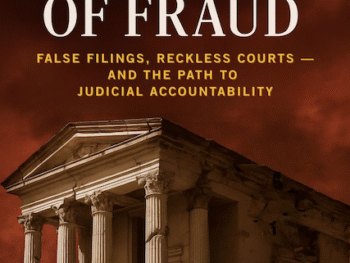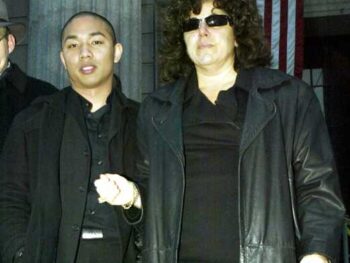
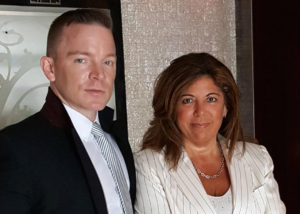
How a Gay Employee Fought Horrific Discrimination and Won a Major Legal Victory
On Monday, the U.S. Court of Appeals for the 2nd Circuit ruled that Matthew Christiansen could sue his employer for the horrific sexual harassment he allegedly suffered on the job. Specifically, the court found that Christiansen could pursue a claim of sex discrimination under Title VII of the Civil Rights Act of 1964, which bars sex stereotyping against employees who do not conform to gender norms. In a remarkable concurring opinion, Chief Judge Robert Katzmann wrote separately to explain why Title VII always prohibits employment discrimination on the basis of sexual orientation. If Katzmann is correct—and many judges believe he is—then anti-gay workplace discrimination is already illegal in every state.
Shortly after the ruling came down, I spoke with Matthew Christiansen, the plaintiff in the case, and his attorney, Susan Chana Lask, about the harrowing events that led up the 2nd Circuit’s decision in Christiansen v. Omnicom Group. Our interview has been edited and condensed. It should be noted that these allegations, which defendants vigorously dispute, have not yet been proved in court.
Mark Joseph Stern: Tell me about the discrimination you experienced at work.
Matthew Christiansen: It started when I took the job. Former Chief Digital Officer Joe Cianciotto drew caricatures of me on a dry-erase board. They were crude and disgusting—rendering me as half-man, half-horse, pooping and peeing, or as an overly pumped gay guy with a huge hard on, saying, “I’m so pumped for marriage equality.”
It grew from that. It extended to the rest of the agency when he hung up this poster for a party that featured my head on the body of a woman on her back in a bikini with her legs up in the air. He posted it all over the agency and on Facebook. He tagged me in it, and he’s Facebook friends with every top-tier advertising professional you can imagine—all the clients I could want to work with. It was totally humiliating, and he spread it around the entire industry. Later, he asked people I managed if I had HIV. He accused me of having AIDS and made fun of the way I dressed. He called me a “poof” and a “bottom” and said I “obviously slept with everyone.” He singled me out and tore me down in front of people I’m supposed to manage.
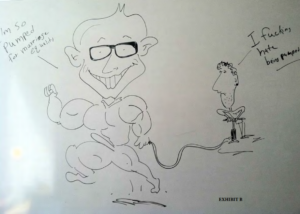
Susan Chana Lask: We later learned that Joe was running around from day one saying, “Look at the new guy, he’s so gay, he must have AIDS!”
Christiansen: The worst incident came in May 2013. I was with a team of 15 employees. And Joe said: “I was sick all weekend. I felt terrible. I felt like I had AIDS! You know what that’s like, right, Matt?” Then he sat down right next to me, looked me in the face, and laughed.
That was one of the worst moments of my professional career and my life. I’m HIV-positive, but I had no idea if he knew. I was so utterly embarrassed and terrified that my big secret had been told to all the people I work with on a daily basis. And I was scared that everyone on the team would think that they could talk to me that way.
Stern: How did you make the decision to bring a lawsuit?
Christiansen: I spoke with several lawyers and was very discouraged. They told me there’s no protection for gays on the federal level and that a lawsuit wasn’t really going to work. And they would also ask questions about what my role in this was—like, how did I perpetuate this? As though it was my fault. I started to believe that I must have done something wrong even though all I did was come to work.
Finally, one lawyer referred me to Susan. When I met with her, the first thing she said to me was: “Do they want to get sued?” Then she said: “I think this is fate. I want to take your case.” That was the first time someone said they wanted to actually help me.
Lask: No one would help Matt—basically, they said he “deserved it.” And they refused to even try to interpret the law to fight for Matt’s rights. I wanted other LGBT people to be empowered. They need to know that this can be done.
Christiansen: I used to tell myself that every day, since of course it was a struggle coming into work and being around people who heard these things about me. I had to look into the mirror and tell myself, “You’re right, you’re doing the right thing, you’re not alone. There’s someone else out there dealing with the same thing.”
Stern: So you stayed in the job, even after you sued?
Christiansen: Yes. From the very beginning, I didn’t want to leave, because I didn’t do anything wrong. On the other hand, I didn’t want to be there because I was so humiliated. Just having to see the people every day that had witnessed all this stuff—it’s embarrassing.
Lask: I said, whatever you do, don’t leave. Let’s make a point and get the bully out of there. The bully was Joe Cianciotto. A major player, the chief digital officer.
Christiansen: The objective was to make him leave. Why should I leave? I did nothing wrong. And I can’t really leave my job—I can’t lose my insurance. I can’t just commit financial and physical suicide because someone decides to discriminate against me at work. I have to fight. Plus, there are people who could be going through the same thing I am who are watching me. I can’t just up and leave.
Lask: It felt like a big knockout punch for Matt to say, “You’re not going to make me leave this job. I’m going to sue you and stay employed. You’re going to pay me while I’m suing you. You’re going to change your ways.”
Stern: You initially filed the lawsuit anonymously. How did Matt’s name become public?
Lask: When we first filed the suit, it was anonymous because of Matt’s HIV status. The only reason we revealed his name was because the attorneys on the other side threatened to make it public and we said, screw you. I asked Matt, are you prepared to do this ourselves? And he said, yeah, put it out there. So we put his name on it.
After his name was in the papers, he said, “Susan, I’m so freaked out to go to work.” But when he did, people he didn’t even know came up to him and hugged him. They just said, “thank you,” then left.
It turns out people have been complaining about Joe Cianciotto for 10 years. But because he was able to bring in $25 million accounts, people would say: “Oh, that’s just Joe. Don’t worry.” I talked to 20 employees who worked with him, and I was crying after I got done with those interviews. This guy was able to run around like a dictator, screaming things, making fun of employees’ sexuality, making gay men describe what gay sex is to him because he “wants to know what it’s like.”
Stern: What happened to Cianciotto?
Christiansen: After the story broke, Joe just sort of disappeared. But the company never announced his departure. Of course, they came out and said my case had no merit—to the press, to the court, and in all-agency emails. They tried to scare me, intimidate me, and make me feel uncomfortable in the workplace. And they certainly made a point to speak out against me in the press. But Joe just … disappeared.
The company also asked me to write a Pride campaign for them while I was suing them for discrimination! They knew that if I said no, it’d give them a reason to fire me.
Lask: He was all upset, and I said, “Matt, just do it and do a great job.”
Stern: So you wrote the campaign?
Christiansen: I did. I wasn’t going to back down and make them think I was afraid of them. Susan always said: “You go do the advertising, let the pit bull do the law. Just send in your pit bull and everything will be fine.” But I was terrified. It’s one things to know your rights and have someone on your side who’s going to fight for you. But when you’re up against this multibillion-dollar corporation with their army of lawyers, it’s very scary.
Lask: I don’t care if you have a billion dollars and a thousand lawyers. You can’t deny the facts and the law. Matt was just coming into work and doing his job—and getting horribly harassed simply because of who he is. As the court said on Monday, that isn’t just wrong: It’s against the law.

